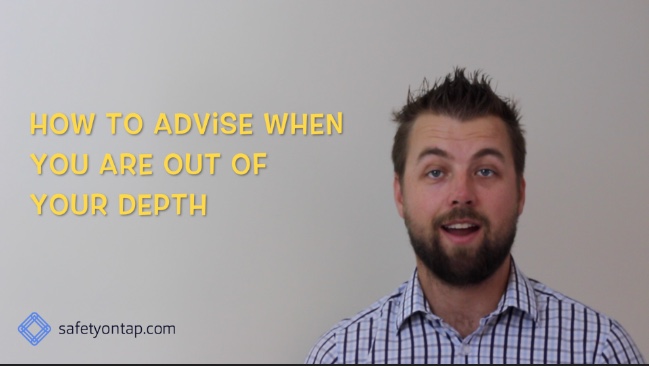Hi there Andrew Barrett here from Safetyontap.com TV. In this quick video I’m going to share my 5 tips on how to advise when you are out of your depth.
This important because we will all have been, or will be in that situation sometime in our career. Paradoxically, the more you have experienced this, the more likely you are to be growing yourself more.
You might be thinking a health and safety person is ethically not allowed to advise when you are out of your depth – which is true and correct. And potentially dangerous if you wing it.
So let’s break this down – how to advise when you are out of your depth, here’s my 5 tips for you.
Tip #1, don’t set the expectation that you are there for advice, that you have the answers. It doesn’t matter whether you do or you don’t have the answers, just don’t set that expectation.
Tip #2, position yourself as the facilitator, coach or mentor, for the experts who are actually doing the job. Yes, I said experts – the people doing the job are the experts so treat them like that. I often say something like my role is to bring my expertise in managing risk and solving problems, together with your understand of your own work/work environment etc.
Tip #3, ask good, open questions. How does this work? Can you explain what this thing does? How do you guys coordinate to do blah? When this happens how do you manage? You’ll learn more, and you’ll help others learn because of the perspective you’ve brought, simply by asking questions.
Tip #4 Think out loud. So when you described that step, you mentioned this tool is more of a problem than help. Has something happened before? Or What do you think might happen? These questions are applying a risk management lens to the work being explained – clarifying, asking open questions, leading you to a better understanding of the other person’s understanding.
Tip #5 If you are in a situation where there is something specific you’ve been asked, which you should know but you don’t, be honest – say I don’t know. But make sure you follow this with a commitment: I will find out, or even better, let’s find out together right now. The find out – contact someone else, do some research – learn what you need to know.
So that’s our 5 tips for how to advise when you are out of your depth
- Don’t set the expectation that you are there for advice
- Position yourself as the facilitator
- Ask good, open questions
- Think out loud, and
- Be honest if you don’t know, and commit to finding out.
This is Andrew Barrett from safetyontap.com. Seeya!

